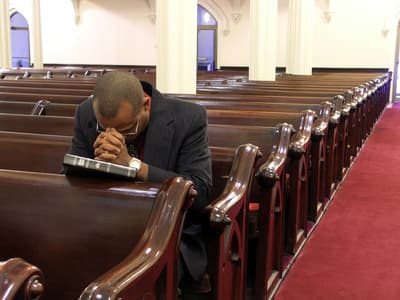Podcast: Revelation Questions 5


Check out the So We Speak podcast on Apple Podcasts or Spotify.
Revelation 7 is where things start to get more interesting as far as the book’s narrative goes. This is also where the four different views of the book begin to carry more weight. For an overview of these four views, check out the Revelation Overview post.
What is the scroll that the Lamb opens?
There are three ideas when it comes to the scroll. The first idea is that it is the “deed” to the universe. Even though Satan is the ruler of the present world, this would show God reclaiming the universe as his own.
A second idea is that this is God’s scroll of judgment (see Romans 1). As the Lamb breaks each seal, judgments poured out on the earth. Finally, a third viewpoint is that there are seven seals and, in Roman times, people wrote wills with seven witnesses. This scroll could be seen as a last will and testament. Additionally, quite a few people want to connect this to the scroll in Daniel. The very end of Daniel points to a future event with a book/scroll.
While there are several ideas about what the scroll might be, there is no common unity among those ideas.
Can Christians today have the gift of prophecy like John?
There is a difference between the gift of prophecy and what is happening with John in Revelation. This has nothing to do with John’s gifting. It is God’s angel coming to John to show him these visions and John writing them down. It is something God revealed to John – not something in John.
Any “new” revelation from God must be entirely consistent with the past and authoritative revelation of God. For more on this topic, see Cole’s posts “In Spirit and in Truth” on our blog.
What about the souls under the altar?
Revelation 6:9 mentions souls under the altar. Does this imply we go to heaven when we die instead of soul sleep? It seems like these individuals have gone straight to heaven. There are Scriptures that support both the idea of soul sleep and direct ascent to heaven after death. In the direction of soul sleep, these saints were told to “rest a little longer” after they ask God about the timing of all the saints being in heaven.
We are bound by linear thinking because we live in time. God, however, is not bound by time and sees the big picture of history and time. We need to be okay with seeming contradictions because, in our limited human capacity, we cannot understand how seeming opposites can both be equally true.
It is important to note that this is not a topic of such importance that it is imperative for us to know. We can rest knowing God knows what he is doing in all of life – both in birth and death.
Who were the 144,000?
One view (symbolic view) is that 1,000×12(squared) (equaling 144,000), symbolically those numbers really come across as representing all of God’s people from all of time. God is sealing all his faithful people throughout time. This has nothing to do specifically with the Jews.
Another view (the futurist perspective) carries a dispensational flavor. This viewpoint would argue that this is referring to the specific number of Jews from each tribe who accept Christ and, during the seven years of tribulation, are going to become evangelists. However, how would we know who is from which tribe? From the human perspective, we cannot tell who is from which tribe.
Brittany Proffitt lives in Dallas and is a writer and content manager for So We Speak.




